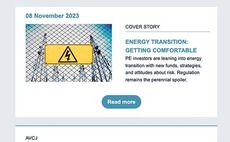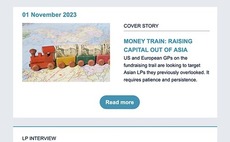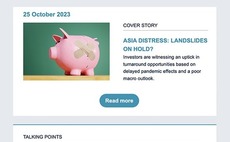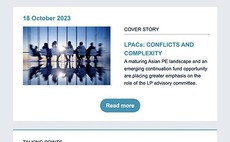Tech investment has been on a tear in Asia, with PE joining VC at the party. While COVID-19 has contributed to these dynamics, the revival is rooted in deeper structural change.
|
|
|
|
|
|
|
 |
A private equity bidding war for Toshiba Corporation has yet to materialize, but Bain Capital is pushing ahead with what would be Japan's second-largest PE buyout, having agreed a $7.5 billion carve-out of Hitachi Metals. Spare a thought for the make-up of the GP's investor consortium and what that might say about the changing dynamics of Japan.
In 2012, KKR's move for ailing chipmaker Renesas Technologies was thwarted by Innovation Network Corporation of Japan (INCJ), which rallied a group of local conglomerates to support a rival bid. In 2018, a Bain-led consortium agreed to buy Toshiba's flash memory division for $17.8 billion. INCJ once again participated, but there was no domestic rescue effort, perhaps due to the size of the deal or the fact that Tokyo wants conglomerates to focus on their core businesses. Most of the supporting capital came from foreign strategic players.
Fast forward to the present and Bain is working on the Hitachi Metals deal with Japan Industrial Partners and Japan Industrial Solutions. Both have funds of $1 billion-plus, putting them in the vanguard of domestic GPs that have the capacity to participate in transactions of this size. Several years ago, few – if any – could make this claim. Hitachi Metals is a joint endeavor, but more "Japanese solutions" are likely to feature in the battle for corporate carve-outs.
|
|
|
Two pet food deals in the space of a few days? Perhaps we shouldn't be so surprised, given the cross-border appeal of premium produce from New Zealand and Australia – whether it is for people or animals. KKR has bought New Zealand-based Natural Pet Food Group (NPFG) from local GP Pioneer Capital, while Quadrant Private Equity has acquired Australia's Prime100. International expansion was a theme during Pioneer's ownership of NPFG, with China highlighted as a target market. Quadrant previously did the same with Real Pet Food, which was eventually sold to an Asian consortium.
|
|
|
|
|
 |

Conservative yet contrarian, Samena Capital has carved its own path prioritizing patience, trust, and transparency. A younger generation of leadership is guiding entry into a new digital landscape.
Read more
|
|
|
|
|

Australia's Main Sequence Ventures, a government-established VC, has raised 100% of its second fund with outside capital. It credits much of the success to the high barriers of hard science.
Read more
|
|
|
|
|

Singapore's Cityneon has seen a robust rebound in its live events business, driven primarily by China. The company now has $177 million in new funding and deals covering everything from ancient Egypt to Avatar.
Read more
|
|
|
|
|
|
|
 |
There have only been four $1 billion-plus private equity-backed IPOs in India. Food services platform Zomato is attempting to become the fifth, having filed to raise as up to $1.11 billion through a domestic offering. It is poised to join even more select company as one of few Indian consumer internet start-ups to go public in the past decade, at home or overseas. Zomato, which dominates online food delivery alongside Swiggy, has raised over $1.25 billion in funding from the likes of Ant Group, Tiger Global Management, Sequoia Capital India, and Temasek Holdings. Will this mark the beginning of a rich vein of local liquidity events?
|
|
|
|
|
|
|
 |
We may look back on 2021 as the high-water mark of China's competitiveness relative to Western industry leaders in leading edge chip fabrication technologies, according to Rhodium Group. Policy support for the semiconductor industry remains strong, but chip players in other markets also stand to benefit from increased investment and government backing. Meanwhile, there remain significant technical and commercial challenges – from subscale semiconductor equipment manufacturers to a lack of high-end talent – to China's drive for self-sufficiency.
Read more
|
|
|
The global private equity industry in early 2021 strongly resembles the picture a year earlier, characterized by robust fundraising, rising deal volume, and elevated multiples. But McKinsey & Company flags up three vectors of change for GPs and LPs. First, the rise of diversity, equity, and inclusion (DE&I), leading to greater emphasis on identifying and tracking relevant metrics – in private equity firms as well as in portfolio companies. Second, non-financial indicators, chiefly environmental, social, and governance (ESG) considerations, playing a more prominent role in investment decision making. Third, a shift in working practices, with remote interactions having proven more effective in fundraising and dealmaking than had been expected.
Read more
|
|
|
|
|
|
|
 |
|
|
|
|

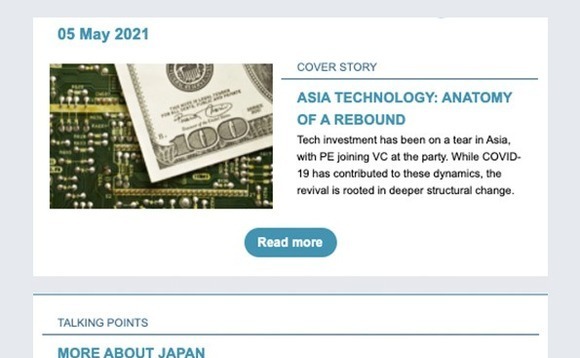
![]()





